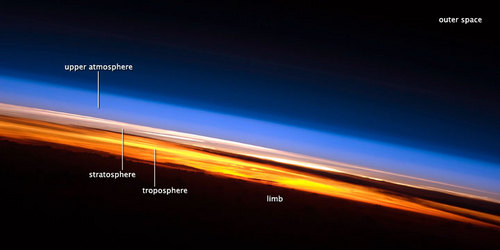Look at how thin our atmosphere is: Difference between revisions
Siterunner (talk | contribs) No edit summary |
Siterunner (talk | contribs) No edit summary |
||
| Line 27: | Line 27: | ||
Alexander Gerst on the '''#ISS''' [http://blogs.esa.int/alexander-gerst/] [http://www.esa.int/spaceinimages/Images/2014/06/Our_ecosystem] | Alexander Gerst on the '''#ISS''' [http://blogs.esa.int/alexander-gerst/ Astro Gerst blog] [http://www.esa.int/spaceinimages/Images/2014/06/Our_ecosystem] | ||
"Look at how thin our atmosphere is. This is all there is between humankind and deadly space." [http://www.greenpolicy360.net/mw/images/ISS_040e008179_earth%27s_atmosphere_l.jpg] | "Look at how thin our atmosphere is. This is all there is between humankind and deadly space." [http://www.greenpolicy360.net/mw/images/ISS_040e008179_earth%27s_atmosphere_l.jpg] | ||
Revision as of 16:52, 5 October 2014
OCO-2 Orbiting Carbon Observatory
'Watching the Earth Breathe from Space' [1]
Ω
Observing Global Warming with #OCO-2 Historic launch #planetcitizen mission to study #earthsatmosphere
"First Light!" [2] [3] OCO-2 tweets - https://twitter.com/IamOCO2 OCO-2 announces 'We have data!'
What monitoring a potential existential crisis looks like...spectra from #OCO-2 #Earth360 [4]
Earth observing satellites, the "Afternoon Constellation", the "A-Train" joined by #OCO-2 newly launched and historic in its mission to study global warming Orbiting Carbon Observatory
Looking closer at OCO-2 [5] [6] [7]
Earth science data is coming in and being openly distributed. Take up the challenge, perhaps with NEX here and multiple venues that are being made available for the first time.
Add your resources. With the launch of OCO-2, a 'game changer', the data of #Earth360 will grow in unprecedented ways.
Add your #PlanetCitizen talent to a future of seeing with an #EarthPOV -- #Earthdata enables informed decisions and policy
Ω
Alexander Gerst on the #ISS Astro Gerst blog [8]
"Look at how thin our atmosphere is. This is all there is between humankind and deadly space." [9]
June 17 - Alexander Gerst on the #ISS [10]
A thin atmospheric layer enabling life as we know it... [11] [12] [13] [14] [15] [16] [17] [18] [19]
We are just beginning to geo-monitor our thin atmosphere, earth and biosphere from space... [20] [21]
Beginning with first-ever images of our home planet, Earth, taken from the Apollo era... [22] [23]
We are now flying eyes-in-the-sky, earth-monitoring producing first-generation data and #sustainability realizations.
An #EarthPOV, a visual Overview that, over time, will educate and inform us...
Seeing how thin our atmosphere is
NASA’s Orbiting Carbon Observatory-2 (OCO-2): A game changer? http://climate.nasa.gov/blog/1105 [24]
Seeing climate change from space: NASA creates image-based iPad app [25]
Soon, each of us will be able to connect to and share earth-data as students of earth-space science and new digital networks.
With open data, links and digital apps, schools and future generations will learn new ways of seeing as citizens of the planet.
Isn't it about time we look carefully?
Ω
Micro-satellites - #earthdata from space #atmosphere and #earthresources[26]
"Look at how thin our atmosphere is. This is all there is between humankind and deadly space"
- Astronaut Alexander Gerst, June 2014 / http://blogs.esa.int/alexander-gerst
A "paper thin" layer absorbing the sum of human-produced hydrocarbon & emission "externalities"
_ _ _ _ _ _ _ _ _ _ _ _ _ _ _ _ _ _ _ _ _ _ _ _ _ _ _ _ _
Tag: #EarthPOV; #Overview; #Troposphere; #ThinLayer
Permalink: http://www.greenpolicy360.net/w/Look_at_how_thin_our_atmosphere_is
Ω


